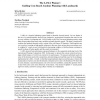Free Online Productivity Tools
i2Speak
i2Symbol
i2OCR
iTex2Img
iWeb2Print
iWeb2Shot
i2Type
iPdf2Split
iPdf2Merge
i2Bopomofo
i2Arabic
i2Style
i2Image
i2PDF
iLatex2Rtf
Sci2ools
149
Voted
JAIR
2010
2010
The LAMA Planner: Guiding Cost-Based Anytime Planning with Landmarks
LAMA is a classical planning system based on heuristic forward search. Its core feature is the use of a pseudo-heuristic derived from landmarks, propositional formulas that must be true in every solution of a planning task. LAMA builds on the Fast Downward planning system, using finite-domain rather than binary state variables and multi-heuristic search. The latter is employed to combine the landmark heuristic with a variant of the well-known FF heuristic. Both heuristics are cost-sensitive, focusing on high-quality solutions in the case where actions have non-uniform cost. A weighted A∗ search is used with iteratively decreasing weights, so that the planner continues to search for plans of better quality until the search is terminated. LAMA showed best performance among all planners in the sequential satisficing track of the International Planning Competition 2008. In this paper we present the system in detail and investigate which features of LAMA are crucial for its performance...
Heuristic | JAIR 2010 | LAMA | Weighted A∗ Search |
| Added | 28 Jan 2011 |
| Updated | 28 Jan 2011 |
| Type | Journal |
| Year | 2010 |
| Where | JAIR |
| Authors | Silvia Richter, Matthias Westphal |
Comments (0)

